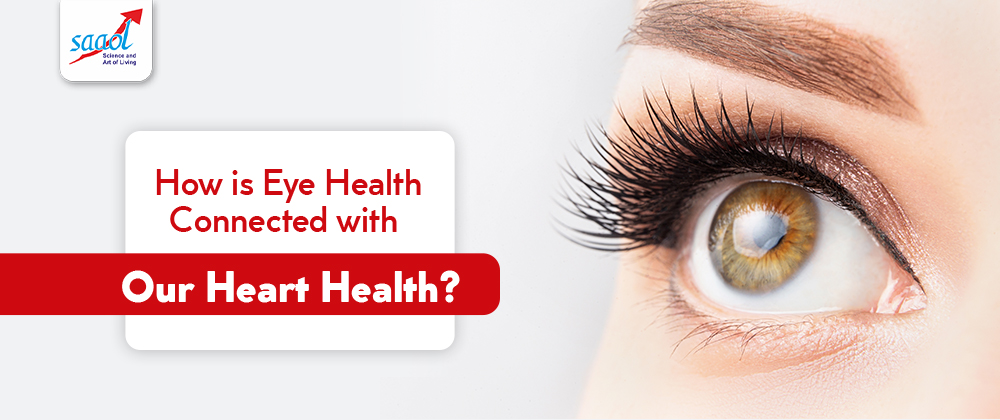How is Eye Health Connected with Our Heart Health?
SAAOL
- July 26, 2023
- 4 Min Read

How is Eye Health Connected with Our Heart Health?
When we talk about heart health, our focus often centers around cholesterol levels, blood pressure, and lifestyle choices. However, we tend to overlook an important relationship —the connection between heart health and eye health. Recent research has shed light on the significant impact that the condition of our cardiovascular system can have on our eyes and vision. In this blog, we will delve into the fascinating link between heart health and eye health, uncovering the shared risk factors, conditions, and preventive measures that can help us maintain optimal well-being for both organs. By understanding this connection, we can take proactive steps to protect both our hearts and our eyes.
Shared Risk Factors Between Eye and Heart Health
Hypertension (High Blood Pressure):
Studies have shown that high blood pressure, a common risk factor for cardiovascular diseases, can also have detrimental effects on eye health. Increased pressure can damage the delicate blood vessels in the eyes, leading to conditions such as hypertensive retinopathy and optic nerve damage. This shared risk factor highlights the need to manage blood pressure for the well-being of both the heart and the eyes.
Atherosclerosis:
Atherosclerosis, the buildup of plaque in the arteries, not only affects blood flow to the heart but can also restrict blood flow to the eyes. Insufficient blood supply to the eyes can cause vision problems, including retinal artery occlusion or retinal vein occlusion, which can result in vision loss or blindness. The presence of atherosclerosis emphasizes the interplay between heart health and eye health.
Diabetes:
Diabetes, characterized by high blood sugar levels, is a significant risk factor for both heart disease and various eye conditions. Diabetic retinopathy, a leading cause of blindness, occurs when high blood sugar levels damage the blood vessels in the retina. Additionally, diabetes increases the risk of heart disease and stroke, further emphasizing the connection between these two organs.
Conditions Shared Between Eye and Heart Health
Cardiovascular Disease and Retinal Diseases:
Several retinal diseases have been linked to cardiovascular diseases. For example, age-related macular degeneration (AMD), a leading cause of vision loss in older adults, has been associated with an increased risk of heart attack and stroke. Common underlying factors such as inflammation and oxidative stress may contribute to the development of both conditions.
Glaucoma and Cardiovascular Health:
Studies suggest an association between glaucoma, a group of eye diseases characterized by increased intraocular pressure, and cardiovascular problems. Reduced blood flow to the optic nerve, similar to atherosclerosis affecting the heart’s blood vessels, may contribute to the development or progression of glaucoma. Additionally, certain medications used to treat cardiovascular conditions may have side effects that increase the risk of glaucoma.
Preventive Measures
Adopt a Healthy Lifestyle:
Engaging in a healthy lifestyle can positively impact both heart and eye health. Regular exercise, a balanced diet rich in fruits, vegetables, and omega-3 fatty acids, and avoiding smoking and excessive alcohol consumption can reduce the risk of cardiovascular diseases and certain eye conditions.
Prioritize Regular Health Check-ups:
Routine medical check-ups are essential for early detection and management of both heart and eye conditions. Regular blood pressure and cholesterol screenings, as well as comprehensive eye examinations, can help identify potential problems at their early stages, allowing for timely interventions.
Manage Chronic Conditions Effectively:
Proper management of chronic conditions like diabetes and hypertension is crucial. Adhering to prescribed medications, monitoring blood sugar and blood pressure levels, and following healthcare professionals’ guidance can help prevent complications in both the heart and the eyes.
Protect Your Eyes:
Wearing protective eyewear, such as sunglasses that block harmful UV rays, can shield the eyes from potential damage. Additionally, maintaining good eye hygiene, taking regular breaks during prolonged screen use, and practicing eye exercises can help reduce eye strain and maintain optimal eye health.
Conclusion
The connection between heart health and eye health is a vital consideration that should not be overlooked. Shared risk factors, conditions, and preventive measures highlight the intricate relationship between these two organs. By prioritizing heart health through a healthy lifestyle, regular check-ups, and effective disease management, we can enhance not only our cardiovascular system but also protect our precious vision. SAAOL Heart Center understands the significance of this connection, offering specialized care that encompasses comprehensive well-being. Take the first step towards a healthier future by contacting SAAOL Heart Center today!
Ready to prioritize your heart and eye health? Contact SAAOL Heart Center today for specialized care that focuses on comprehensive well-being. Take control of your health and embark on a journey towards a heart-healthy life with clear vision. Together, let’s pave the way for lasting well-being.
